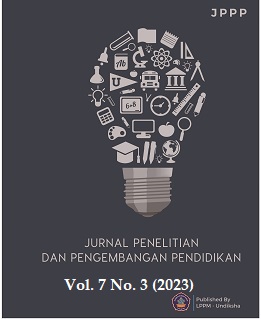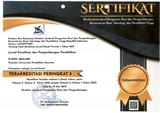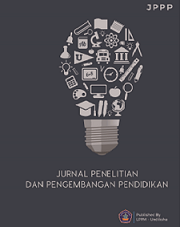Impact of School-University Partnerships and Professional Learning Communities
DOI:
https://doi.org/10.23887/jppp.v7i3.64910Keywords:
Implementing Partnerships, Professional Learning Communities, School-University Partnerships, Teaching & Learning CollaborationAbstract
School-university partnerships and professional learning communities (PLCs) are important approaches to school reform that have the potential to improve teaching and learning and improve student outcomes. School-university partnerships are collaborative relationships between schools and universities that aim to improve teaching and learning outcomes by providing access to resources and expertise and by developing new curricula and instructional materials. This study analyzes the positive impact of partnerships and communities on teaching and learning outcomes but also acknowledges the challenges they face such as time constraints, funding, and cultural differences. The research method uses Systematic Literature Review (SLR). The data collection process is carried out by identifying and evaluating scientific articles that are relevant to the topic. A literature search was conducted through academic databases, such as PubMed, ERIC, and Google Scholar. The data found analyzed to identify patterns, trends, and consistencies in the findings. Drawing on existing literature and case studies of successful partnerships found that these collaborative models have the potential to significantly improve educational outcomes for students while providing meaningful professional development opportunities for teachers. Success factors include building relationships based on mutual respect and trust, ongoing communication and collaboration and structured professional development. It was concluded that implementing partnerships will create a culture for continuous improvement within the school community.
References
Admiraal, W., Schenke, W., Jong, L., Emmelot, Y., & Sligte, H. (2021). Schools as Professional Learning Communities: What Can Schools Do to Support Professional Development of Their Teachers? Professional Development in Education, 47(4), 684–98. https://doi.org/10.1080/19415257.2019.1665573. DOI: https://doi.org/10.1080/19415257.2019.1665573
Bernay, R., Stringer, P., Milne, J., & Jhagroo, J. (2020). Three models of effective school–university partnerships. New Zealand Journal of Educational Studies, 55, 133–148. https://doi.org/10.1007/s40841-020-00171-3. DOI: https://doi.org/10.1007/s40841-020-00171-3
Boyd, A. S., & Darragh, J. J. (2020). Critical literacies on the university campus: Engaging pre-service teachers with social action projects. English Teaching, 19(1), 49–63. https://doi.org/10.1108/ETPC-05-2019-0066. DOI: https://doi.org/10.1108/ETPC-05-2019-0066
Budiarti, N. D., & Sugito, S. (2018). Implementation of Inclusive Education of Elementary Schools: a Case Study in Karangmojo Sub-District, Gunungkidul Regency. Journal of Education and Learning (EduLearn), 12(2), 214–223. https://doi.org/10.11591/edulearn.v12i2.8727. DOI: https://doi.org/10.11591/edulearn.v12i2.8727
Burn, K., Conway, R., Edwards, A., & Harries, E. (2021). The role of school‐based research champions in a school–university partnership. British Educational Research Journal, 27(3), 616–633. https://doi.org/10.1002/berj.3675. DOI: https://doi.org/10.1002/berj.3675
Burroughs, G., Lewis, A., Battey, D., Curran, M., Hyland, N. E., & Ryan, S. (2020). From mediated fieldwork to co-constructed partnerships: A framework for guiding and reflecting on P-12 school–university partnerships. ,. Journal of Teacher Education, 71(1), 122–134. https://doi.org/10.1177/0022487119858992. DOI: https://doi.org/10.1177/0022487119858992
Burton, S. L., & Greher, G. R. (2007). School—University Partnerships: What Do We Know and Why Do They Matter? Arts Education Policy Review, 109(1), 13–24. https://doi.org/10.3200/AEPR.109.1.13-24. DOI: https://doi.org/10.3200/AEPR.109.1.13-24
Carpenter, D. (2015). School culture and leadership of professional learning communities. International Journal of Educational Management, 29(5), 682–694. https://doi.org/10.1108/IJEM-04-2014-0046 DOI: https://doi.org/10.1108/IJEM-04-2014-0046
Cavanagh, M., Chen, X., Bathgate, M., & Haney, J. J. (2021). The impact of professional learning communities on teacher efficacy: A meta-analysis. Review of Educational Research, 91(1), 28–58. https://jedu.marvdasht.iau.ir/article_4814.html?lang=en.
DeMonte, J., & Hanna, F. J. (2014). How professional learning communities improve teaching practice. Educational Leadership, 72(2), 34–39. https://www.taylorfrancis.com/chapters/edit/10.4324/9781315716800-6.
Desimone, L. M., Porter, A. C., Garet, M. S., Yoon, K. S., & Birman, B. F. (2002). Effects of professional development on teachers’ instruction: Results from a three-year longitudinal study. Educational Evaluation and Policy Analysis, 24(2), 81–112. https://eric.ed.gov/?id=EJ1229435. DOI: https://doi.org/10.3102/01623737024002081
Dharma, S., & Siregar, R. (2015). Internalisasi Karakter melalui Model Project Citizen pada Pembelajaran Pendidikan Pancasila dan Kewarganegaraan. JUPIIS: Jurnal Pendidikan Ilmu-Ilmu Sosial, 6(2). https://doi.org/10.24114/jupiis.v6i2.2293. DOI: https://doi.org/10.24114/jupiis.v6i2.2293
Dorfman, L. Y., & Kalugin, A. Y. (2020). Resources, potentials and academic achievements of students: Part 1. Differentiation of resources and potentials [Соотношение ресурсов, потенциалов и академических достижений студентов cообщение 1. дифференциация ресурсов и потенциалов]. Obrazovanie i Nauka, 22(4), 64–88. https://doi.org/10.17853/1994-5639-2020-4-64-88. DOI: https://doi.org/10.17853/1994-5639-2020-4-64-88
Elkordy, A. (2016). Development and implementation of digital badges for learning science, technologly, engineering and math (STEM) practices in secondary contexts: A pedagogical approach with empirical evidence. In Foundation of Digital Badges and Micro-Credentials: Demonstrating and Recognizing Knowledge and Competencies (pp. 483–508). Springer International Publishing. https://doi.org/10.1007/978-3-319-15425-1_27. DOI: https://doi.org/10.1007/978-3-319-15425-1_27
Faulkner, M. L., Huang, J., & Smith, J. J. (2012). Building a successful school-university partnership: The Baltimore elementary and middle school mathematics project. Journal of Mathematics Education Leadership, 14(2), 1–11. https://papers.ssrn.com/sol3/papers.cfm?abstract_id=4394654.
Ferraz, O. L., Vidoni, C., & Boas, M. V. (2021). Bridging the gap between theory and practice: the impact of school–university partnership in a PETE program. Sport, Education and Society, 26(7), 788–799. https://doi.org/10.1080/13573322.2020.1851182. DOI: https://doi.org/10.1080/13573322.2020.1851182
Gainsburg, J. (2015). The impact of teacher collaboration on student academic achievement. Journal of Inquiry & Action in Education, 6(1), 1–12. https://eric.ed.gov/?id=EJ1294581.
Garet, M. S., Porter, A. C., Desimone, L., Birman, B. F., & Yoon, K. S. (2001). What makes professional development effective? Results from a national sample of teachers. American Educational Research Journal, 38(4), 915–945. https://akjournals.com/view/journals/2059/4/2/article-p41.xml. DOI: https://doi.org/10.3102/00028312038004915
Graham, S., Driscoll, A., MacArthur, C., & Jaffe, L. (2015). The National Writing Project and writing instruction in America’s schools. Theory Into Practice, 54(2), 171–179. https://papers.ssrn.com/sol3/papers.cfm?abstract_id=4394654.
Greaney, K., & Arrow, A. (2014). The Importance of Teaching Phonological-Based Spelling Skills. Kairaranga, 15(1), 20–25. https://doi.org/10.54322/kairaranga.v15i1.182. DOI: https://doi.org/10.54322/kairaranga.v15i1.182
Green, C. A., Tindall-Ford, S. K., & Eady, M. J. (2020). School-university partnerships in Australia: A systematic literature review. Asia-Pacific Journal of Teacher Education, 48(4), 403–435. https://doi.org/10.1080/1359866X.2019.1651822. DOI: https://doi.org/10.1080/1359866X.2019.1651822
Guo, Y., Xu, J., & Wu, Z. (2020). The effects of professional learning community on teacher efficacy: A meta-analysis. Educational Research Review, 29, 100318. https://search.proquest.com/openview/a50aab8bb7d1de498b352373c23b913c.
Guridi, J. A., Pertuze, J. A., & Pfotenhauer, S. M. (2020). Natural laboratories as policy instruments for technological learning and institutional capacity building: The case of Chile’s astronomy cluster. Research Policy, 49(2), 103899. https://doi.org/10.1016/j.respol.2019.103899. DOI: https://doi.org/10.1016/j.respol.2019.103899
Hamilton, M., O’Dwyer, A., Leavy, A., Hourigan, M., Carroll, C., & Corry, E. (2021). A case study exploring primary teachers’ experiences of a STEM education school-university partnership. Teachers and Teaching, 27(1–4), 17–31. https://doi.org/10.1080/13540602.2021.1920906. DOI: https://doi.org/10.1080/13540602.2021.1920906
Heinz, M., & Fleming, M. (2019). Leading Change in Teacher Education: Balancing on the Wobbly Bridge of School-University Partnership. European Journal of Educational Research, 8(4), 1295–1306. https://eric.ed.gov/?id=EJ1231641. DOI: https://doi.org/10.12973/eu-jer.8.4.1295
Hermida, D. J. (2011). The Importance of Teaching Academic Reading Skills In First-Year University Courses. SSRN Electronic Journal, 1–12. https://doi.org/10.2139/ssrn.1419247. DOI: https://doi.org/10.2139/ssrn.1419247
Irving, K. E. (2006). The impact of technology on the 21st century. Teaching Science in the 21st Century, March 1981, 3–19. https://cmapsconverted.ihmc.us/rid=1JVHR9TKT-1VMCFZP-SHW.
Kim, H., Lee, J. H., & Kim, S. (2020). The impact of professional learning communities on teacher collaboration, instructional practices, and student achievement. Teaching and Teacher Education, 92, 102961. https://mededu.jmir.org/2022/2/e38259.
Li, Q., & Huang, J. (2020). The effects of professional learning communities on teachers’ job satisfaction: A meta-analysis. Educational Research Review, 30, 100318. https://psyarxiv.com/cds45/download/?format=pdf.
Lupo, S., Galletta, A., & Sardo, S. (2021). Professional learning communities for teachers: A systematic review of literature and meta-analysis. Teaching and Teacher Education, 107, 103279. https://search.proquest.com/openview/184a1d222cf1bbe57473977c61b1d98e/1?.
Maheady, L. J., Patti, A. L., Rafferty, L. A., & del Prado Hill, P. (2019). School–university partnerships: One institution’s efforts to integrate and support teacher use of high-leverage practices. Remedial and Special Education, 40(6), 356–364. https://doi.org/10.1177/0741932518812689. DOI: https://doi.org/10.1177/0741932518812689
Manfra, M. M. (2019). Action research and systematic, intentional change in teaching practice. Review of Research in Education, 43(1), 163–196. https://doi.org/10.3102 /0091732X18821132. DOI: https://doi.org/10.3102/0091732X18821132
Manton, C., Heffernan, T., Kostogriz, A., & Seddon, T. (2021). Australian school–university partnerships: The (dis) integrated work of teacher educators. Asia-Pacific Journal of Teacher Education, 49(3), 334–346. https://doi.org/10.1080/1359866X.2020.1780563. DOI: https://doi.org/10.1080/1359866X.2020.1780563
Maulana, I., Rahma, N. A., Mahfirah, N. F., Alfarizi, W., & Darlis, A. (2023). Meningkatkan Profesional Guru dengan Program Pendidikan Profesi Guru (PPG). Journal on Education, 5(2), 2158–2167. https://doi.org/10.31004/joe.v5i2.867. DOI: https://doi.org/10.31004/joe.v5i2.867
O’Connor, C., & Michaels, S. (2017). Shifting the focus to student learning: A review of the evidence on formative assessment. Harvard Educational Review, 87(4), 371–399. https://search.proquest.com/openview/2c4c94185542cd3d21e23de4dfa41af5/1.
Óskarsdóttir, E., Donnelly, V., Turner-Cmuchal, M., & Florian, L. (2020). Inclusive school leaders – their role in raising the achievement of all learners. Journal of Educational Administration, 58(5), 521–537. https://doi.org/10.1108/JEA-10-2019-0190. DOI: https://doi.org/10.1108/JEA-10-2019-0190
Rollwagen-Bollens, G., Holmlund, T., & Wait, J. (2022). Actively Participating in University-Sponsored Ecological Research Increases High School Students’ Knowledge of and Attitudes About Science. Frontiers in Environmental Science, 9(January), 1–15. https://doi.org/10.3389/fenvs.2021.797769. DOI: https://doi.org/10.3389/fenvs.2021.797769
Stehle, S. M., & Peters-Burton, E. E. (2019). Developing student 21st Century skills in selected exemplary inclusive STEM high schools. International Journal of STEM Education, 6(1), 2. https://doi.org/10.1186/s40594-019-0192-1. DOI: https://doi.org/10.1186/s40594-019-0192-1
Su, C.-Y., Li, Y.-H., & Chen, C.-H. (2021). Understanding the Behavioural Patterns of University Teachers Toward Using a Learning Management System. International Journal of Emerging Technologies in Learning (IJET, 16(14), 129–145. https://doi.org/10.3991/ijet.v16i14.22685. DOI: https://doi.org/10.3991/ijet.v16i14.22685
Vartiainen, H., Pöllänen, S., & Liljeström, A. (2016). Designing Connected Learning: Emerging learning systems in a craft teacher education course. Design And, 21(2), 32–40. https://ojs.lboro.ac.uk/DATE/article/download/2115/2281.
Vescio, V., Ross, D., & Adams, A. (2008). A review of research on the impact of professional learning communities on teaching practice and student learning. Teaching and Teacher Education, 24(1), 80–91. https://www.tandfonline.com/doi/abs/10.1080/09243453.2020.1808484. DOI: https://doi.org/10.1016/j.tate.2007.01.004
Walsh, M. E., & Backe, S. (2013). School–university partnerships: Reflections and opportunities. Peabody Journal of Education, 88(5), 594–607. https://doi.org/10.1080/0161956X.2013.835158. DOI: https://doi.org/10.1080/0161956X.2013.835158
Wang, Y., & Liu, J. (2020). Professional learning communities and teacher professional development: A systematic review. Teaching and Teacher Education, 90, 103002. https://journals.sagepub.com/doi/abs/10.1177/2212585X221124155.
Williams, C., & Beam, S. (2019). Technology and writing: Review of research. Computers & Education, 128, 227–242. https://doi.org/10.1016/J.COMPEDU.2018.09.024. DOI: https://doi.org/10.1016/j.compedu.2018.09.024
Wong, M., Steiner, E. D., & Cook, L. (2016). The UCLA community school: A partnership between the Los Angeles Unified School District and the University of California, Los Angeles. Journal of Education for Students Placed at Risk, 21(2), 91–102. https://www.sciencedirect.com/science/article/pii/S1750946722000344.
Downloads
Published
How to Cite
Issue
Section
License
Copyright (c) 2023 Moses Adeleke Adeoye, Olaolu Paul Akinnubi, Yusuf Suleiman, Musa Aremu Mahmud, Hassanat Abdullateef Jimoh

This work is licensed under a Creative Commons Attribution-ShareAlike 4.0 International License.
Authors who publish with the Jurnal Penelitian dan Pengembangan Pendidikan agree to the following terms:
- Authors retain copyright and grant the journal the right of first publication with the work simultaneously licensed under a Creative Commons Attribution License (CC BY-SA 4.0) that allows others to share the work with an acknowledgment of the work's authorship and initial publication in this journal.
- Authors are able to enter into separate, additional contractual arrangements for the non-exclusive distribution of the journal's published version of the work (e.g., post it to an institutional repository or publish it in a book), with an acknowledgment of its initial publication in this journal.
- Authors are permitted and encouraged to post their work online (e.g., in institutional repositories or on their website) prior to and during the submission process, as it can lead to productive exchanges, as well as earlier and greater citation of published work. (See The Effect of Open Access)








